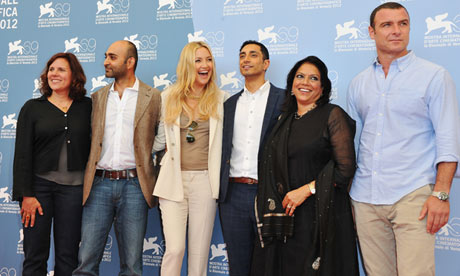
If the Venice film festival needed an electric charge to shock it into motion, it came midway through the world premiere of The Reluctant Fundamentalist, when a Wall Street hotshot watches the planes hit the World Trade Centre and then flashes an exultant smile at his TV screen. "In that moment I should have felt sorrow or anger," our hero confesses. "But all I felt was awe."
The Reluctant Fundamentalist – directed by Mira Nair from the novel by Mohsin Hamid – is a globalised rites-of-passage tale, torn between two worlds, pointed towards disaster, and damning capitalism and terrorism with the same brush. Yet while the material may be contentious, its director insisted that the film be viewed as a dialogue rather than a confrontation.
"I hope American audiences receive it as it was intended – as a film made by people who understand what it is to love America," Nair said. "I hope they see it as a conversation between two cultures that goes beyond the prejudices that contaminate us. I really believe, unlike George W Bush, that it's not a case of 'You're either with us or against us'. There is a third way. There is common ground."
The Reluctant Fundamentalist stars the British actor Riz Ahmed as Changez, a Pakistani immigrant who first chases and then rejects the American dream, eventually falling in with a group of radical Islamists back in his native Lahore.
"Changez grows up between two worlds, and as a British Pakistani I can relate to that," Ahmed explained. "I attended a university [Oxford] where my cultural background was very different to those around me. But the film is about getting rid of those labels and stereotypes – or at least stretching the labels wide enough so that we can live inside them comfortably."
It could be argued that The Reluctant Fundamentalist brings its director full circle. Indian-born and New York-based, Nair won the Venice Golden Lion award for her 2001 drama Monsoon Wedding. The prize was handed out on 9 September, - just 48 hours before the terrorist attacks.
"I remember it well," said Nair, now 54. "I live in New York. My husband and family were in the city. It took me a week to get back there and, when I did, the whole place reminded me of images from my home country – the refugee camps, the sense of a war zone, the sense of fear. In New York you rarely hear anyone speaking English. Everyone is a foreigner and yet everyone belongs. But suddenly it became a place where everyone who looked like us was viewed as 'the other'. It was a deeply disturbing time – both for us and for the world."
The Reluctant Fundamentalist sets the stage for what is being regarded as a mouthwatering lineup at this year's festival. Potential highlights include To the Wonder, a new drama from the revered director Terrence Malick, and Spring Breakers, a student heist caper shot by the iconoclastic American film-maker Harmony Korine. Elsewhere, the controversy looks likely to be provided by Paul Thomas Anderson's The Master – reputedly a thinly veiled biopic of Scientology founder L Ron Hubbard.
The oldest festival on the movie calendar, Venice celebrates its 69th birthday with a refurbished site and a new artistic director in Alberto Barbera. "The festival is like a grand old lady," Barbera told Italian journalists earlier this summer. "A refined lady, but one in need of freshening up."
Barbera's solution is a more even spread of established film-makers, with emerging talent from outside the Hollywood orbit. Among the new arrivals are Hinde Boujemaa, whose documentary, It Was Better Tomorrow, probes the consequences of the Tunisian revolution, and Haifaa al-Mansour, reportedly Saudi Arabia's first female feature film director. "A festival should not just be a catwalk for celebrities," Barbera has insisted.
Those in the running for this year's Golden Lion must convince a panel headed by Michael Mann, the American director behind Heat, The Insider and Public Enemies. Asked by Barbera to deliver an opening statement, Mann appeared momentarily stumped before electing to keep it simple. "We have a terrific jury," he said. "Everyone is looking forward to seeing some exciting work over the next 10 days." When navigating a confusing, shifting, globalised world, it is sometimes best to focus on the fundamentals.

